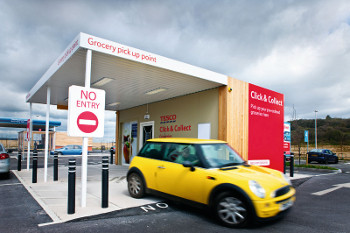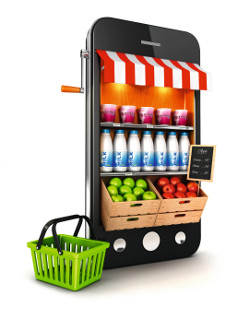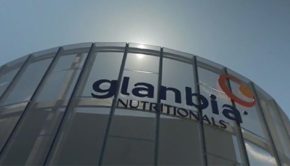Driving online shopping forwards

Barry Collins' SuperValu in Carrigaline is currently trialling a new drive-through service, with Musgrave stating it hopes to roll out more at SuperValu stores nationwide by end of the year. Gillian Hamill reports on the new phenomenon
19 March 2014

More typically associated with fast-food restaurants, the news that Collins’ SuperValu in Carrigaline in Co. Cork introduced a drive-through option last month, created a stir within the FMCG trade. Officially launched on Tuesday, 18 February, the new service is already proving popular with shoppers. According to store manager Glenn Leacy: "We would have upwards of 20 – 25 shoppers currently using it each week and the numbers have been growing every week for the last four weeks since we installed it."
The facility’s success in Carrigaline bodes well for its future adoption. At the time of the launch, SuperValu managing director Martin Kelleher said the chain hopes to roll out the service to a "number of stores" by the end of the year. However a spokesperson for the Musgrave Group told ShelfLife that future locations for the new service have yet to be confirmed. Of course, some Irish shoppers would have already made a foray into the world of supermarket drive-throughs, as Tesco already operates a similar ‘click-and-collect’ scheme at Clarehall Shopping Centre and Maynooth.
Online timeline
And although SuperValu Carrigaline was specifically chosen to pilot this latest service, as a group, SuperValu has certainly been no slouch in the retail tech and online shopping stakes. It first introduced its online shopping and interactive grocery app in 2011, with a store collection and home delivery service. Next, the supermarket chain introduced ‘self-scanning’ hand-held devices in Quish’s SuperValu in Ballincollig, Co Cork last May. This service, which allows customers to scan products as they shop, has been rolled out to 17 stores across the country, and has been used by 30,000 unique customers in the past year.
Now, as Glenn Leacy explains, shoppers don’t even have to leave the comfort of their car in order to get all their groceries loaded into the boot. The click-and-collect service costs €3 or else is free when a customer spends €75 or more online. Customers order their shopping online and can either collect it at the customer service desk or drive-through area. With the latter, they simply tell staff their order reference code through an intercom system, and it is immediately brought out to the car, at which point they can simply flip open their boot and staff will load the car up. As Leacy points out, the service is particularly useful for "customers who may be working all day through the week with nobody available at home to meet the delivery driver. Instead, after work, they can just drop down to their local SuperValu and pick up their order."
Dedicated packing staff
As you would expect, the service needs dedicated resources in-store to work efficiently. Fast turnaround times are required in order to meet collection deadlines. As Leacy explains: "If a customer orders tonight, they can actually pick up their shopping at any time from 11am onwards tomorrow morning. And if someone orders any time up to 2pm, they can actually pick it up that evening – so they could come in at 6pm to pick up the shopping straight after work." The supermarket subsequently has three staff who are tasked with packing all the online orders on a permanent basis. Leacy explains why it was necessary to have dedicated staff to fulfil this role from the off, noting: "It’s like everything, when you start off you need to get people into a routine, so obviously now the three people that we have are very familiar with the layout of the shop."
After making their first online order, the process also becomes easier for customers, because handily, the online website and app will remember the details of their previous purchase. This is useful, because as Leacy points out: "Most people buy the same things every week with a couple of changes that might take place, but there’s a lot of lines that are repeat purchases every single week."
Extra storage equipment was not necessary for the drive-through service at Carrigaline, because as a large outlet, it already had storage back-up facilities available. Nevertheless, Leacy explains that for any online orders for either collection or delivery, "there’s also a designated area within the dairy back-up cabinet or the red meat back-up cabinet to store all the different online orders because we would have quite a few different orders on any given day. For example, last Friday we had 29 online shops on that day alone, so that takes three people the full day to get all those done…Some of those orders are going out at 11 o’clock in the morning, that’s our first deadline time, so the packing staff would be in from 7 o’clock that morning preparing some of those orders."
Making substitutions
The service also delivers greater convenience for customers in that they are given an option of accepting a substitute product if their original choice is not available. "In some cases, the substitutes are probably beneficial for the customer," says Leacy. "Let’s say if you order Nescafé 100g Gold Blend and we have Gold Blend on offer with an extra 50g free, that comes up as a line that’s not available because it’s changed pack and the barcode is different, so we’d give the customer an extra 50 grams for the same price and obviously they’re thankful for that." Continuing on the topic of product substitutions, he adds: "Some customers don’t mind but some people don’t like to have a substitute line so we would try and keep the substitute to the same product, to the same kind of brand and also unless the price is severely different, we’d actually ring the customer and let them know and say would you like this instead? We don’t mind picking up the phone or emailing the person to give them an option."
Drive-through pioneers
Explaining more about why the Carrigaline supermarket would have been chosen as the first SuperValu in the country to test-drive the new service, Leacy attributes this partly to the store’s size. At 28,000 sq ft, it is actually the second largest store in the SuperValu group. Leacy adds: "We already had the facilities of the online shopping and with the fact that we are in Cork, we are close to Musgraves’ head office so that obviously all ties in together. I suppose it’s easier for them to do a trial based on a localised store in Cork which is close to their own head office so they can watch and observe before they roll it out nationally." Summing up why he believes the new drive-through service is an important development, he comments: "It’s innovative and it’s trying to move online shopping on a little more. We can’t just accept online as it is…we need to change things and move things around a little bit as well."
This is a similar sentiment to that shared by Tesco’s Ken Towle, who is now managing director of Central Europe and Turkey at Tesco plc, but previously served as Online Food and Internet Retailing director. In an article published in September 2012 on the retailer’s website, Towle explained the inspiration behind Tesco’s decision to become the first supermarket in the UK to launch a click-and-collect drive-through service in 2010.
Introducing the car park ‘pod’
The chain already offered customers the option of picking up online purchases of "general merchandise and clothing" from its branches. According to Towle: "We started thinking; if we can do all of this for general merchandise and clothing, how great would it be to be able to do this for food? A much more challenging thing to do; typically 60 products in an order, in three different temperature zones. Before too long the first trial was in place, a van in the car park that customers could collect their Dotcom food order from. It proved to be a winner for customers so the team quickly developed a pod that sits in the car park. And just two years later we are now rolling this service out across the country and it’s growing in popularity every day." Since then, Tesco has reported its click-and-collect service was available in 200 Tesco stores across the UK in 2013; a number expected to rise to 300 stores this year.
In fact, according to IGD research, the UK online food and grocery market will be worth £11.1bn by 2017, almost double its recorded value in 2012 of £5.6bn. This represents a compound annual growth rate (CAGR) of 14.6% between 2012 and 2017. Customer uptake and shopping frequency on smartphone and tablet formats are the biggest driving factors behind this growth. The research also found that one third of shoppers would shop more online if petrol prices go up further and that 46% would be encouraged to buy more groceries online if they received personalised promotions by email.
Picking up shopping on the school run
What’s more, an announcement of a new trial by Tesco in October last year, showed there is still plenty of room for further innovation to flourish. The grocery giant extended its click-and-collect service for shoppers on-the-go. The new mobile service, trialled in three locations in York, has allowed Tesco customers to click-and-collect from convenient locations across their community, including schools, libraries and sports centres. An obvious application is that time-pressured parents would be able to pick up their shopping while doing the school run.
As Simon Belsham, managing director of Tesco.com says: "We think customers are really going to like the extension to the service because it makes things even more convenient for them and it means they can fit their shopping in around their lifestyles." Fitting into your customers’ lives more fluidly clearly represents the changing face of retail and is an area in which no major retailer can afford to fall behind.



 Print
Print






Fans 0
Followers